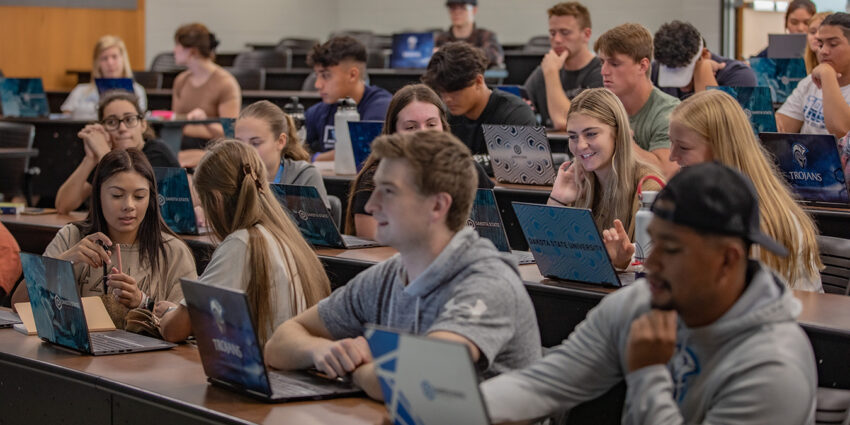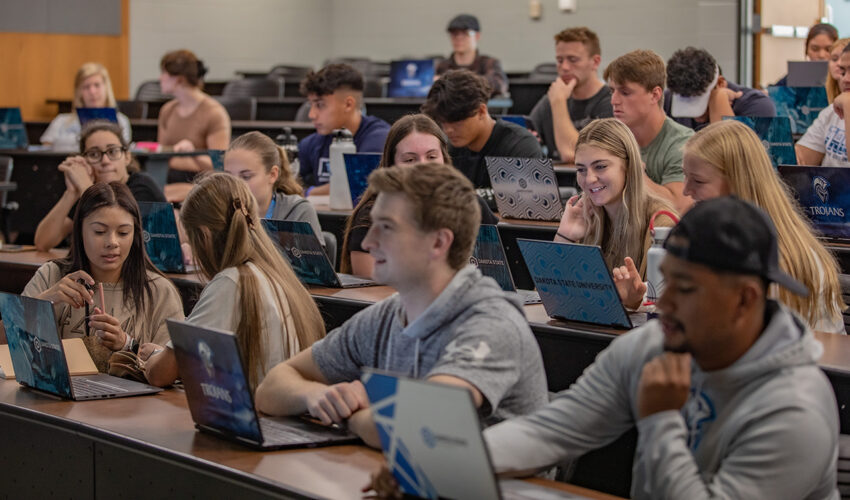DSU to offer new blockchain class this spring
Nov. 16, 2022
This paid piece is sponsored by Dakota State University.
“Blockchain is a new technology I think will be broadly used in the future,” Dr. Yenling Chang said.
Chang and two other instructors at Dakota State University will offer a new course this spring that will look at blockchain from technology, finance and marketing/management perspectives.
The course, open to sophomore students and above, is a crucial way to prepare for future employment in the business world.
“Students from a business perspective need to know what the capabilities are of this technology and how they can take advantage of it,” Dr. Deb Tech said. She, Chang and Bailey Belisario will teach the course to provide different perspectives and focus.
“This course won’t make you an expert in any of those three areas, but it will give you enough information so you can navigate blockchain technology and make informed decisions,” said Tech, an associate professor in the College of Business and Information Systems.
Tech sees an opportunity to improve supply chain issues in the marketing and management area of blockchain applications. The use of blockchain in tracking supply chain allows transparency to see what is happening in real-time.
“You can see what has happened when it’s left on the dock or whether or not the truck broke down,” Tech said. “All this information can be easily shared among everyone in the blockchain network.”
Lots of money is lost because of supply chain issues. The use of blockchain technology may show where problems arise and allow businesses to develop solutions.
Other blockchain applications include cryptocurrency, non-fungible tokens and international trade.
Chang sees blockchain applications in finance as new territory. “I’m pretty sure the financial services industry will be changed with this new technology.”
Chang, an associate professor in the College of BIS, has been reading case studies about internationally recognized companies that use blockchain in providing financial services to the international trade community.
“I analyze how blockchain impacts companies in terms of their operations, management and efficiency of use,” she said.
Blockchain can be permissionless or permissioned. Chang explained that Bitcoin is a permissionless, decentralized ledger system that allows anyone interested in engaging in the activities to be a part of that community. Permissioned blockchain requires people to register and disclose themselves to the community, and an administrator limits access. Permissioned blockchains may be centralized.
International trade is a potential area of impact, which traditionally requires companies to go through their banks to process the trade. This requires time to verify and authenticate documents, which can take weeks. Blockchain can secure and digitize the process while also accelerating it.
“Blockchain requires the entire community to verify and validate every piece of information going through the chain, which makes it difficult to change documents,” Chang explained.
In addition to international trade, organizations can use blockchain in other areas of financial services, marketing, warehouse management and more.
She hopes students who take the class develop their own ideas for blockchain applications, and she expects to be inspired by their creativity as they embrace the new technologies.
Belisario, a research engineer in the Applied Research Lab, will teach the technical side of blockchain.
“From the technological standpoint, I want people to understand how it can be applied in the business world and economics,” he said.
One way he will teach is through labs where students will learn how to use the technology, interact with Bitcoin’s blockchain and send transactions to each other. He hopes the labs will help people understand how value can be moved in cyberspace.
While he primarily will focus on Bitcoin, he also will help students identify where potential failures or vulnerabilities exist in using blockchain in a centralized manner as some other cryptocurrencies do.
“I don’t see blockchain as revolutionary, but I see the implementation of Bitcoin, personally, as a revolutionary technology,” he said.











